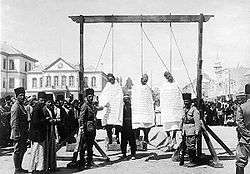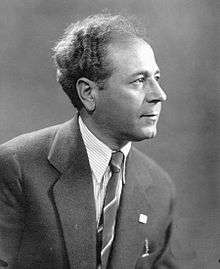Syrian nationalism
Syrian nationalism, also known as Pan-Syrian nationalism, refers to the nationalism of the region of Syria, or the Fertile Crescent as a cultural or political entity known as "Greater Syria". It should not be confused with the Arab nationalism that is the official state doctrine of the Syrian Arab Republic's ruling Arab Socialist Ba'ath Party, nor should it be assumed that Syrian nationalism necessarily propagates the interests of modern-day Syria or its government. Rather, it predates the existence of the modern Syrian state (independent from French colonial rule in 1946), and refers to the loosely defined Levantine region of Syria, known in Arabic as "al-Sham".
History
Syrian nationalism arose as a modern school of thought in the late 19th century, in conjunction with the Nahda movement, then sweeping the Ottoman-ruled Arab world.
The first Syrian nationalist is considered to be Butrus al-Bustani, a Mount Lebanon-born convert from the Maronite Church to Protestantism, who started one of the region's first newspapers, Nafir Suria in Beirut in the aftermath of the Mount Lebanon civil war of 1860 and the massacre of Christians in Damascus the same year.[1] Bustani, who was deeply opposed to all forms of sectarianism, said "love of the homeland is a matter of faith" (Arabic: حب الوطن من الإیمان).
As early as 1870, when discerning the notion of fatherland from that of nation and applying the latter to Greater Syria, Francis Marrash would point to the role played by language, among other factors, in counterbalancing religious and sectarian differences, and thus, in defining national identity.[2] This distinction between fatherland and nation was also made by Hasan al-Marsafi in 1881.
Ideology
Syrian nationalism posited a common Syrian history and nationality, grouping all the different religious sects and variations in the area, as well as the region's mixture of different peoples. Thus, while not per se anti-Arab it opposed the Arab nationalist ideology and its pan-Arab underpinnings, that somewhat later was to grow all over the Arab world, not least in Syria itself.
It opposes any particular Arab claims to these areas, preferring an all-encompassing Syrian nationality; also, it is a generally secular movement, believing that a Syrian can have any religion indigenous to the area: Sunni or Shia Muslim, Christian or Jewish. This has attracted many Christians to it (as well as to the equally non-religious Arab nationalism), since the Christian churches form a religious minority in the Middle East, and often fear being dwarfed by Muslim majority populations.

Syrian nationalism often advocates a "Greater Syria", based on ancient concepts of the boundaries of the region then known as Syria (stretching from southern Turkey through Lebanon, Palestine into Jordan and Iraq). A modern-day political movement that advocates these borders, is the Syrian Social Nationalist Party (SSNP), founded in 1932 by Antun Saadeh. The present-day borders of the area are seen as artificial and illegitimate imperial divisions, imposed on the region by the Anglo-French Sykes–Picot Agreement and as well as the creation of Israel as an independent state. However, the SSNP accepted from an early stage that specific political and communal conditions in Lebanon meant that for the time being Lebanon would have to remain in existence as a separate state. In later years, and particularly since 1970, the main body of the party has also come to adopt a more nuanced position regarding Arab nationalism. It no longer openly proclaims that the Syrian people are non-Arabs, but rather regards Greater Syria as playing a vanguard role among the Arab peoples. Smaller factions which split from the party maintain a position inimical to Arab nationalism, however.

References
- ↑ Tauber, Eliezer (1 February 2013). The Emergence of the Arab Movements. Routledge. ISBN 978-1-136-29301-6.
- ↑ Suleiman, p. 114.
Sources
- Suleiman, Yasir (2003). The Arabic Language and National Identity: A Study in Ideology. Edinburgh University Press.
Saadeh, Antoun, The Genesis of The Nations

